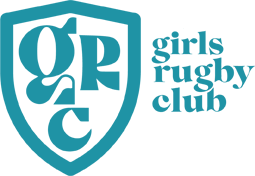If you’re reading this, you’re almost finished the Girls Rugby Club crash course on periods and how they impact performance and training. This one is all about tracking. If you’ve missed the first two posts on the menstrual cycle, we recommend heading back to our blog section and reading them in order from one to three.
As part of our Player Welfare campaign we’ve teamed up with the brilliant Kelly McNulty to bring you everything you need to know. Kelly is a PhD student at Northumbria University studying the effects of the menstrual cycle and hormonal contraceptive use on athletic performance, adaptation and recovery. With both a Bachelor of Science (BSc) degree in Sport and Exercise Science and a Master of Science (MSc) degree in Strength & Conditioning, it’s safe to say Kelly knows her stuff. She’s also doing some exciting bits with her soon-to-be launched podcast
The Period of the Period so stay tuned!
Here is the third blog post from Kelly – ‘The Menstrual Cycle –Tracking’.
Why track your menstrual cycle?
As discussed in our previous blog, the menstrual cycle could impact upon performance, training, recovery, and health in some sportswomen, therefore learning more about your own menstrual cycle - what symptoms
you experience and how
you perform, train, and recover on certain days – can only be a good thing, right?
Yes. Menstrual cycle tracking offers you the opportunity to understand yourself, your experiences of the menstrual cycle and what that means in the context of your day-to-day life but also your performance and training. At the very least it might help explain why on some days you feel better than others, or at best it can provide you with patterns that help you anticipate or plan to maximise or manage certain nuances of your cycle.
Performance and training aside, tracking also allows you:
- To be prepared so you know when your period is predicted;
- To learn what it normal and not normal for you; and
- Reduce or increase your chances of pregnancy.
 What can I track?
What can I track?

Tracking your cycle can be as simple or as complex as you like, but it’s important to make sure you are recording useful information to help you enhance not only your performance and training, but also your day-to-day life. Also remember it’s important to track for a least 3 months so you can start to pick up on your own cycle patterns and be able to use this data effectively. With that in mind, some of things you can keep track of include:
- When your period (bleeding) starts and ends
- Blood flow heaviness during your period (e.g., spotting, light, moderate, heavy, and very heavy)
- When ovulation occurs (including any symptoms you might be experiencing during this time). You can measure this roughly by using urinary ovulation detection kits and changes in basal body temperature (BBT) and cervical fluid.
- Any changes in BBT. This changes across your menstrual cycle (rises in the luteal phase after ovulation) and can give you some indication of where you are in your cycle.
- Any changes in cervical fluid. This also changes across the menstrual cycle and can be used as another indication of where you are in your cycle (during period: little/ no cervical fluid; before ovulation: tacky, white, and creamy; ovulation: resembles egg whites, slippery, stretching and increases in volume; after ovulation: sticky and dry).
- Any menstrual cycle symptoms (for example: cramps, headaches, breast pain, digestive upsets, and nausea etc.)
- Other physical changes such as changes in sleep, libido, energy levels, and changes in diet/ appetite etc.
- Other emotional changes such as changes in your mood (happy, sad, anxious, strong etc.), stress, and sociability (your need for conversation and being around people)
- Changes in your performance (this could be sport and exercise as well as day-to-day life and productivity during work tasks)
- Changes in your training and recovery in relation to sport and exercise
*Remember you need to be invested in these activities and use methods which suit you (based on time, cost, equipment available etc.) to get the best data! And, whilst it’s up to you what you do with this information, sharing this information with a coach or other support practitioner has the potential to lead to powerful performance conversations.
For more information on the menstrual cycle tracking and monitoring and how you can use this data follow The Period of the Period on Instagram (@periodoftheperiod), Twitter (@periodofperiod), Facebook (@periodoftheperiod) or visit our website
www.periodoftheperiod.com
If you haven't heard yet, Girls Rugby Club camps are back and are on sale now!
CLICK HERE TO SIGN UP FOR A CAMP

 What can I track?
What can I track?
 Tracking your cycle can be as simple or as complex as you like, but it’s important to make sure you are recording useful information to help you enhance not only your performance and training, but also your day-to-day life. Also remember it’s important to track for a least 3 months so you can start to pick up on your own cycle patterns and be able to use this data effectively. With that in mind, some of things you can keep track of include:
Tracking your cycle can be as simple or as complex as you like, but it’s important to make sure you are recording useful information to help you enhance not only your performance and training, but also your day-to-day life. Also remember it’s important to track for a least 3 months so you can start to pick up on your own cycle patterns and be able to use this data effectively. With that in mind, some of things you can keep track of include:


